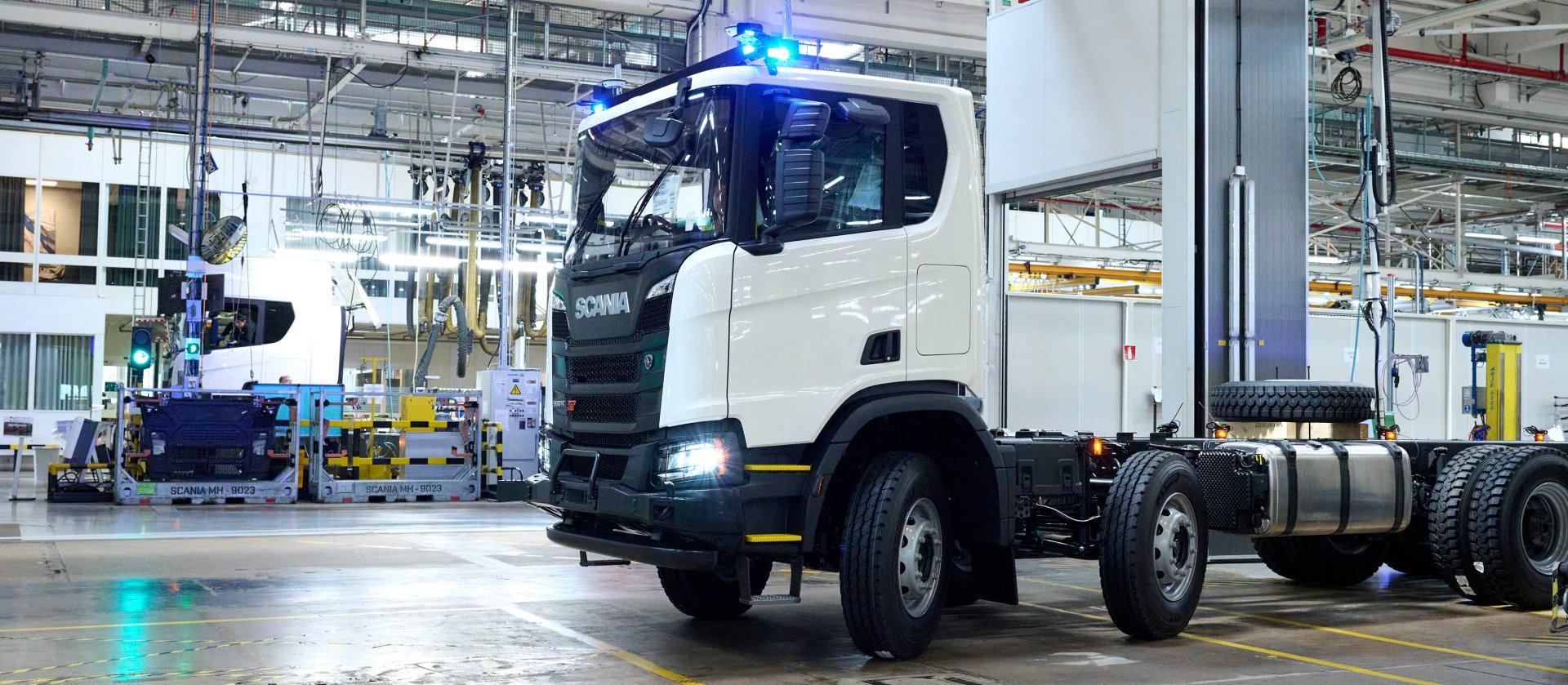A move to autonomous driving and electric vehicles gives Scania the opportunity to move beyond just selling heavy vehicles.

The European automotive industry is under stress from tightening emissions regulations, competition from China and slow sales of electric vehicles (EVs). But Gustaf Sundell, head of ventures and new business at Swedish heavy vehicle company Scania, is feeling positive.
Shifts in technology — particularly the move to sustainable energy sources and autonomous driving — are opening up new areas of customer spend that the truck maker can tap into.
“If you look at the total cost of ownership for a truck, roughly a quarter is the truck,” says Sundell. Another third or so is the driver, then there’s various other costs, tyres, maintenance, fuel. But for Scania, he says, “our full revenue, profit comes from a quarter of customer wallets.”
“What we’re looking at is two-thirds of that wallet opening up,” says Sundell, because there is now an opportunity for a carmaker to replace the driver with automation, and to become a fuel provider by providing electric charging and batteries.
“The opportunity for us to provide even more customer value with the technologies that are coming in is really huge,” he says.
Scania aims to have half the vehicles it sells be electric by 2030, but so far the sale of electric buses and trucks has been relatively slow. All the more reason for the company to look beyond just selling vehicles to offering a whole suite of services in EVs, logistics and self-driving.
This is part of the reason Scania recently built up its internal venture capital investment and venture building capability. Scania has already been investing in startups since 2016 through Scania Growth Capital, a venture fund managed by East Hill Equity. It has made 10 investments this way, mainly focused on later-stage European companies.
Scania’s large investments have not necessarily been straightforward. The company, alongside Volvo, was an investor in Northvolt, the Swedish EV battery maker which filed for bankruptcy protection in the US at the end of last year. Scania loaned the company $100m to help it keep operating through the bankruptcy proceedings.
Last March, however, the company created Scania Invest, an in-house corporate venture team headed by Jessica Persson, which plans to invest further afield and into younger companies.
“This year, we took the steps to go much more global and going much earlier,’ says Persson. The team is interested in tech coming out of universities and accelerators and happy to invest at seed stage.
The team has done eight of these direct, early-stage investments so far, including taking part in the series A funding round for Peak Energy, a US startup developing sodium-ion batteries. Persson says that Scania foresees collaborations with all the companies it has invested in.
The team, which has about 30 people, is also building some of its own ventures internally. Last June, for example, Scania set up its own electric charger installation company, Erinion, to try to speed up the rate at which electric charging points are being installed. Slow rollout of charging networks is seen as one of the biggest bottlenecks to the adoption of electric trucks.
The ventures team is interested in looking at a wide range of areas including energy and infrastructure, asset management, circularity, autonomous driving and supply chain.
Autonomous driving
Autonomous driving has come back onto the radar for many automakers in the past year, and Scania is no different. Arguably, makers of industrial vehicles like Scania can capitalise on autonomous driving more quickly than makers of passenger cars. Last October the company partnered with Australian mining services provider Regroup to launch its first fleet of autonomous in-pit mining trucks in commercial operations.
“To go into an actual commercial sale, instead of just going out and testing together with customers, that was a big step. It’s going from being on the development side to becoming an actual business,” says Sundell.

The fleet of 11 autonomous trucks are expected to start transporting manganese ore in a mine in Western Australia later this year. Autonomous vehicle adoption will come first from these kind of industrial use cases.
“If you look into mining in Australia, with the salary costs and all the costs of having people out in remote areas, it’s a fantastic business opportunity. So that, of course, drives adoption quickly,” he says.
Shuttles that go from one hub to another on set routes will come next. “You see a very strong business case around that as well,” says Sundell. Rolling these out is much easier than building robotaxis that operate on public road. Scania Invest took part in the series B funding round for Waabi, a Canadian startup developing autonomous trucking technology, last June.
Uber for trucks
Sustainable energy is another area where Scania sees an opportunity to expand what it offers. Rather than selling a customer a truck, the company is seeking to sell them a whole low-carbon logistics solution.
“We’re trying to think broadly about how we can help both shippers and carriers to adopt something that helps them reach their science-based [climate] targets. We call it valuable logistics, where you can take care of the full logistics and plan for how to electrify parts and bring down carbon emissions,” says Sundell.
In 2023 the Scania team partnered with Sennder, the German digital road freight forwarder, to create Juna, a pay-per-use service that gives transport companies access to electric delivery trucks.
“Juna is like an Uber for trucks,” says Sundell. “We basically offer them a pay-per-use solution for electric vehicles that we then combine with a shipper guarantee. You have somebody wanting to ship something via electric vehicles, and you have somebody wanting to drive that, you put them together.” Sundell sees the service as a way for companies to derisk the transition to EVs.
Alongside electric vehicles the company is looking at alternative fuels, which Persson says are likely to be needed in the short term in places like Latin America where there is less electrical charging infrastructure.
Long term bets
The new focus on early-stage companies means Scania is taking bets on a few things that may take a while to play out. One recent investment was in Addionics, a UK startup that is developing new ways to enhance electric batteries, not through the chemistry of the battery but by changing the structure of the cell.
“It was just mentioned in The Economist as a hidden but highly disruptive space,” says Persson. “While a lot of industry players are focusing on the different chemistries, this looks at the structure of the actual cell to make it lighter, quicker, to charge, and more efficient.
The team is also investing in Neutreeno, a deep tech startup spun out of the University of Cambridge, which helps organisations with complex supply chains pinpoint where their suppliers can make changes to reduce emissions.
Chinese competition
Many European automotive companies are seen as coming under extreme threat from Chinese rivals, but Persson and Sundell are relatively sanguine.
“We’ve been profitable since 1934 and that means that we’ve always been worried. We’re never satisfied. And of course, we’ve been following what’s happening in China. On the electrification side, we’re really actively investing in China to be a part of that ecosystem and building our presence there on the R&D side,” Sundell says.
Scania’s reported strong interim reports in October, although the order book for future deliveries was down, and orders for electric vehicles have been slow to build.
Sundell believes that a maker of heavy commercial vehicles may be less susceptible to being disrupted by startups or by new Chinese rivals than other automakers.
“When it comes to heavy commercial vehicles, it is actually quite hard to industrialise and scale globally, like we’re done. It’s easy to get some small truck out, but to support that vehicle 24/7, seven days a week, in all conditions — that support is not easy,” says Sundell. “You have to stay humble and you have to stay quick in order to stay ahead right now. But we don’t have a sense of doom.”

Maija Palmer
Maija Palmer is editor of Global Venturing and puts together the weekly email newsletter (sign up here for free).








